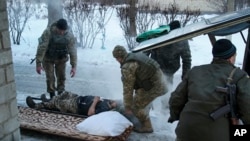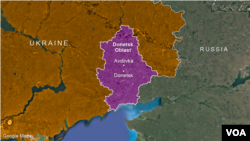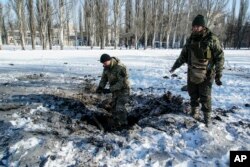The U.S. State Department is voicing "deep concern" about renewed fighting in eastern Ukraine between pro-Russian rebels and government troops, saying the fighting near the Russian border has caused dozens of military and civilian casualties.
A statement Tuesday said the fighting, which erupted Sunday at the Promzona industrial park outside Avdiivka, near the rebel stronghold city of Donetsk, has left 17,000 civilians, including 2,500 children, without water, heat or electricity. It also called for an immediate cease-fire.
Hours earlier, the European Union called the fighting a "blatant violation" of the so-called 2015 "Minsk Protocols"—a truce negotiated with the help of German and French leaders that was designed to include the pullback of heavy weaponry from frontlines.
Since then, there have been reports of numerous truce violations, leading to several new negotiations and new cease-fires. The latest such deal was brokered in the Belarussian capital last August, after a spike in frontline firefights.
Both sides blame the other for the current violence, with Kyiv accusing rebels of using tanks and Grad multiple grenade launchers against government troops. Grad launchers were among the heavy caliber weapons that were to have been withdrawn from frontlines under the original deal.
For their part, rebel leaders in Donetsk, who have battled for autonomy from Kyiv since 2014, are reporting major damage to civilian infrastructure, in media dispatches that mirror the U.S. assessment released Tuesday.
Multiple Ukrainian and Russian news outlets are reporting that a top rebel deputy commander—Ivan Balakai, call sign "Greek," of the separatist Donetsk People’s Republic (DNR)—was killed by Ukrainian forces during intense fighting on Sunday.
“The situation in the area of Avdiivka greatly deteriorated," said Ukrainian news site 112.ua. "[Pro-Russian] militants attempted to storm the industrial zone … and killed seven Ukrainian servicemen. [Ukrainian] forces managed to eliminate the commander of the DNR battalion with the call sign ‘Greek’ and to occupy strategically important positions. The fight for the city has continued for a third day.”
Speaking by video-chat from the frontlines near Avdiivka, Anastasia Stanko of the Kyiv-based Hromadske Internet television described the fighting as constant.
"It's been ongoing since Sunday, it hasn't stopped," she told VOA's Ukrainian Service. "But the fighting is localized. The thousands of people in Avdiivka are leading more or less normal lives. They don't have water, they don't have electricity and it's 16 degrees Celsius, but they're not totally evacuating, because the fighting is outside of town in the special industrial zone. People aren't underground yet."
Nearly 10,000 people—more than half of them civilians—have been killed in fighting that erupted in April 2014, a month after Russia unilaterally annexed Ukraine's Crimea peninsula, and two months after lengthy pro-Western protests in Kyiv forced Ukraine's pro-Russian president into exile.
Moscow repeatedly has been accused of arming and supplying the rebel force, and in 2015 was accused of sending Russian forces across the border and into battle.
Russian President Vladimir Putin discounted those claims, saying any Russian troops found on Ukrainian soil were there as volunteers.
The 2014 annexation sparked widespread protests from Western governments and the United Nations and led to a series of crippling economic sanctions against Moscow by the West that remain in effect nearly three years later.
Ukraine has in recent weeks voiced increasing concern that international pressure on Moscow to end its support for rebels could weaken under the leadership of U.S. President Donald Trump, who has repeatedly voiced support for a thaw in U.S.-Russian relations.
This report was produced in collaboration with VOA's Ukrainian Service.







